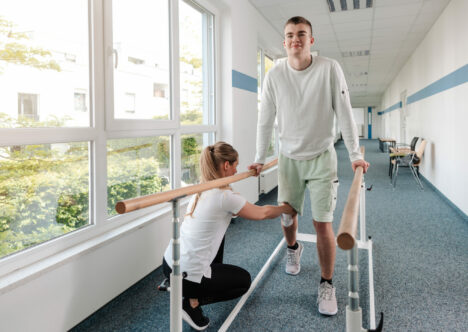What Can Cause a Swollen Knee?
Swelling in your knee is typically caused by one of three things. Your knee may have been damaged due to external trauma, or the swelling may be a result of a meniscal tear or cartilage issues. Each presents its own set of symptoms and requires a different treatment plan.
Trauma

Nearly any type of trauma can cause swelling in the knee. The most common injuries that cause knee pain and swelling are ligament injuries such as ACL tears, fractures (breaks in the bone), and bone bruises. Bone bruises can occur from an external force contacting a knee bone, or more commonly from two of your bones banging against one another, which is what happens when your knee cap dislocates.
If you experienced knee trauma, then your history, physical exam, and available imaging studies will help determine the correct diagnosis. Swelling from trauma often resolves in 4-6 weeks. The underlying problem, however, may continue to be an issue.
Meniscal Tears
The menisci are small c-shaped rubbery discs in your knee that rest between the end of your thighbone (femur) and upper shin bone (tibia). They help provide stability, cushioning, and normal functioning of your knee. At times, these can tear. Frequently, these tears will cause pain in your knee. They may also result in a swollen knee. Usually, meniscal tears cause lesser amounts of knee swelling. However, larger tears may cause greater amounts of fluid in your knee. This swelling will usually persist until the tear is treated.
Cartilage Issues
There are a number of cartilage issues that can cause a painful swollen knee. Osteoarthritis is by far the most common. Osteoarthritis (OA) is a degenerative process in our joints. It leads to a loss of cartilage, bone changes at the joint surfaces, and a release of inflammatory and degenerative mediators throughout the joint.
The common symptoms of osteoarthritis are pain, stiffness, weakness, clicking or catching, the knee giving way, and swelling. Cartilage issues, including OA, can cause greater degrees of swelling inside the knee than other sources of knee swelling. This swelling can occur from loose pieces of cartilage floating around the knee, exposed bone from the loss of cartilage overlying the joint surfaces, and those mediators mentioned above.
Additional cartilage issues that may also cause swelling are inflammatory forms of arthritis, such as rheumatoid arthritis and Lyme arthritis, as well as chondral defects (focal areas of cartilage loss).
Comprehensive Care for Knee Issues at Town Center Orthopaedics
A swollen knee can cause pain, stiffness, and tightness in the joint, and it is always a cause for concern. Swelling in the knee means something is wrong. An expert evaluation is required to make a diagnosis and develop a treatment plan.
The orthopedic experts at Town Center Orthopaedics specialize in knee care. Request an appointment here or call (571) 307-4985 to speak to one of our team members.



